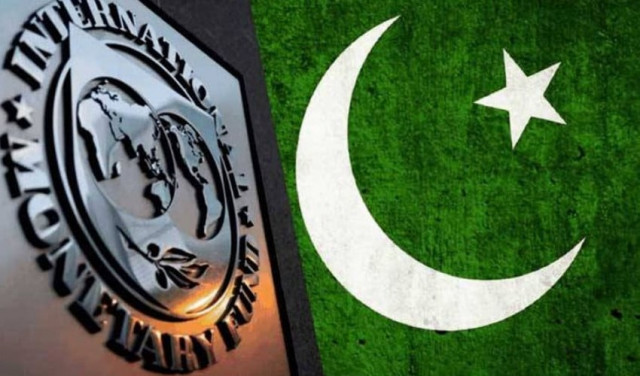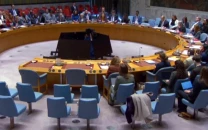Provinces in loop, IMF told
Provinces in loop, IMF told

Pakistan has assured the International Monetary Fund (IMF) that at least three provinces stand ready to amend their laws to increase the agriculture income tax rates to 45%, with Punjab Assembly taking the lead on Thursday.
The Punjab Assembly passed the law soon after the provincial government gave a commitment to enact it within this week. Sindh had linked the approval to Punjab's enacting the law first.
During the ongoing discussions, the IMF has also asked Pakistan to share the information about the idle capacity payments made to all power plants in five years aimed at determining the real positive impact of the government's drive for renegotiating the energy deals on the electricity prices.
The IMF asked to share the actual payment data for the past four years and the projected idle capacity payments for this fiscal year, according to the Pakistani sources. As part of its plans, the IMF has also put an emphasis to renegotiate the Power Purchase Agreements (PPAs) to reduce the cost of electricity for the end consumers.
The government has already terminated five energy purchase contracts and is in the process to review another batch of 18 power plants deals. So far, the focus remains on the plants set up under the 1994 and 2002 policies. The major savings are possible only if the 2015 policy contracts are reopened.
There has also been criticism against the government for protecting the bureaucrats who were hand in gloves with the power plants owners.
Last week, the Special Assistant to the Prime Minister on Power and co-chair of the Energy Task Force, Muhammad Ali, told a parliamentary committee that the federal government anticipated savings of up to Rs300 billion annually from renegotiating or terminating contracts with the IPPs. He stated that the Rs300 billion savings would result in a Rs2 to Rs3 per unit reduction in electricity tariffs.
The current electricity prices excluding taxes are as high as Rs51 per unit for residential consumers and after adding taxes the cost reaches in the range of Rs65 to Rs70 per unit. Out of the Rs51 per unit cost, an amount of Rs18.5 per unit is the idle capacity cost. Another Rs16 per unit is the cross-subsidy that the government forcefully collects from the higher category consumers to provide cheaper electricity to the consumers of up to 200 units.
Ending unjustified cross-subsidy being charged to residential and commercial consumers entails 800% more benefits than renegotiating the energy deals.
Agriculture Income Tax
The IMF has taken separate briefings from the provincial governments on the issues of the provincial finances and the status of the implementation on the IMF condition about increasing the agriculture income tax rate to 45%.
Punjab Assembly passed the agriculture income tax law, which will be followed by the Balochistan Assembly.
The Khyber-Pakhtunkhwa government also assured the IMF that it stood ready to pass the law, as its cabinet had already given an endorsement.
However, the sources said that the K-P Assembly would pass the law only after the Sindh Assembly passes it. The sources said that Sindh has linked its approval with an enactment of the law by the Punjab Assembly. The provinces have apprehension that Sindh may not approve the bill with 45% rate, as the provincial government has already spoken against increasing the rates to 45% in one go.
One draft agriculture income tax bill seen by The Express Tribune suggested that the provincial governments are ready to increase the abysmally low tax rate to as high as 45% and will also impose up to 10% super tax on the high income-earning landlords. Penalties are also being tightened by extending the penalty on default from 25% to 50% of the outstanding amount.
By the end of October, "each province amends their agriculture income tax legislation and regime to fully align it with the federal personal income tax regime for small farmers and the federal corporate income tax regime for commercial agriculture, so that taxation can commence from January 1, 2025," according to the IMF's documents.
The deadline has already been missed by all the provincial governments.
According to the draft proposal, the income tax rate for a small company will be 20% and for a normal company it will be 29%. According to the proposed rates for individuals, on the annual income of more than Rs600,000 to Rs1.2 million, farmers will pay 15% income tax. On income up to Rs1.6 million, the rate will be 20%, on income up to Rs3.2 million, the rate will be 30%, on income up to Rs5.6 million, the rate will be 40% and above Rs5.6 million income, the rate will be 45%.
Likewise, on annual income of more than Rs150 million to Rs200 million, the landlord will pay 1% super tax, on income up to Rs250 million, they will pay 2% super tax, on Rs300 million 3% super tax, on Rs400 million 6% super tax, on Rs500 million 8% super tax and above Rs500 million 10% super tax.
On land ownership, Rs500 to Rs3,500 per acre in taxes will be charged.


















COMMENTS
Comments are moderated and generally will be posted if they are on-topic and not abusive.
For more information, please see our Comments FAQ